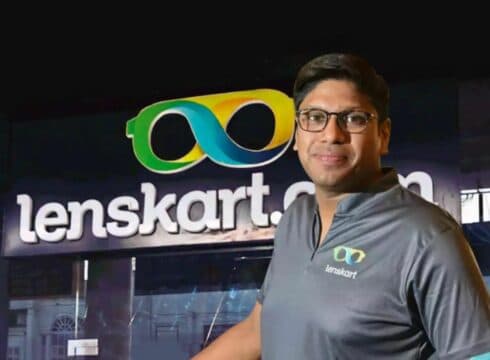Lenskart's CEO and cofounder Peyush Bansal shared that despite having a presence both online and offline, he does not believe in the omnichannel business model
Highlighting the journey of Lenskart, Bansal shared that when the D2C brand was restricted only to the online channel, the conversion rates hovered at about 3%
Despite making sizeable gains, Bansal pointed out his doubt on whether the omnichannel model itself will ensure long-term success for the company
Inc42 Daily Brief
Stay Ahead With Daily News & Analysis on India’s Tech & Startup Economy
Speaking at the Startup Mahakumbh on Monday, Lenskart’s CEO and cofounder Peyush Bansal shared that despite having a presence both online and offline, he does not believe in the omnichannel business model.
The startup founder said that a startup’s bid to identify what business channel might work for them becomes irrelevant when they understand the pain points of the market that they are addressing.
“Customers don’t walk away with a channel but your product or service. I am a big believer that businesses should not be built from the model. They should be built from a problem or a passion area,” he said.
Highlighting the journey of Lenskart, Bansal shared that when the D2C brand was restricted only to the online channel, the conversion rates hovered at about 3%.
To boost the conversion rates, the company first experimented with an offline store in 2012. After realising gains from the experiment, primarily due to eye tests, the company expanded its offline footprint. Since then, Lenskart has expanded to over 2,000 offline stores in the country.
Most recently, the D2C unicorn shared its plans to open 300-400 offline stores outside India. On the back of its omnichannel play, Lenskart reported an operating revenue of INR 1,618.3 Cr for FY22.
However, Bansal pointed out his doubt on whether the omnichannel model itself will ensure long-term success for the company.
“Even I don’t know if the omnichannel approach for Lenskart is a success formula because channels will change. If eye tests begin happening online, then maybe online penetration will increase,” he added.
Meanwhile, sharing the stage at Startup Mahakumbh with Bansal, the cofounder of jewellery startup BlueStone, Gaurav Singh Kushwaha, said that that the startup is banking on the omnichannel model for its D2C play.
“We grew to INR 50-60 Cr revenue when operating only online. Over time, we realised that while people were discovering new jewellery online the trust element was lacking when it came to conversions. The comfort of buying hadn’t matured as much as the confidence in the discovery process. So, a combination of offline and online channels has worked out beautifully for us,” he said co-holding a session at Startup Mahakumbh.
The three-day event started on March 18 (Monday) and will conclude on March 20 (Wednesday). The inaugural ceremony of the event was attended by luminaries such as DPIIT secretary Rajesh Kumar Singh and former NITI Aayog CEO Amitabh Kant. The event hosted 10+ thematic pavilions where startups showcased their innovative offerings.
Zomato’s Deepinder Goyal, EaseMyTrip’s Rikant Pittie, Nykaa’s Falguni Nayar, Lenskart’s Peyush Bansal and Peak XV Partners’ Rajan Anandan were among the other prominent speakers.
{{#name}}{{name}}{{/name}}{{^name}}-{{/name}}
{{#description}}{{description}}...{{/description}}{{^description}}-{{/description}}
Note: We at Inc42 take our ethics very seriously. More information about it can be found here.


